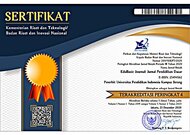Training Needs for Early Childhood Teachers in Improving Technological, Pedagogical, and Content Knowledge Competencies
Abstract
To identify training needs for early childhood education teachers in technology integration is essential to improve learning quality. This study aims twofold: first, to analyze the training needs for early childhood education teachers in the use of technology, and second, to design a TPACK model-based training program that can assist teachers in improving the quality of learning. The present study employed a mixed methods approach, integrating both quantitative and qualitative methodologies. Data were collected through a Training Needs Survey (TNS) and subsequently analyzed utilizing SPSS. The results indicated a substantial competency discrepancy, with an average score of 39.12, falling short of the ideal score of 53. The analysis revealed that teachers continue to encounter various obstacles, including a deficiency in the development of digital teaching materials, constraints in the utilization of hardware and software, and a paucity of experience in employing interactive learning applications. These findings underscore the necessity for Technological Pedagogical Content Knowledge (TPACK)-based training to facilitate effective integration of technology in the learning process. The TPACK model enables educators not only to acquire technological mastery but also to utilize it to enhance children's interaction and engagement in the learning process. The implications offer insight for policymakers, educators, and training institutions in designing more effective training programs to improve the quality of early childhood education in the Karangpawitan Subdistrict of Garut Regency.
Keywords
Full Text:
PDFReferences
Adhikari, R., & Timsina, T. P. (2024). An Educational Study Focused on the Application of Mixed Method Approach as a Research Method. OCEM Journal of Management, Technology & Social Sciences, 3(1), 94–109. https://doi.org/10.3126/ocemjmtss.v3i1.62229
Adiyono, A., Hayat, E. W., Oktavia, E. D., & Prasetiyo, N. T. (2024). Learning interaction in the digital era: Technological innovations and education management strategies to enhance student engagement. Journal of Research in Instructional, 4(1), 205–221. https://doi.org/10.30862/jri.v4i1.333
Anggraeni, N., & Listiana, A. (2023). The Role of Contemporary Pedagogical Technology in ECE: A Systematic Literature Review. Indonesian Journal of Educational Research and Review, 6(1), 99–110. https://doi.org/https://doi.org/10.23887/ijerr.v6i1.55648
Ashraf, H., Ata, G., & Rizwan, A. (2023). Training Need Analysis Model for Teachers and Managers: A Case of Trainings at Quaid e Azam Academy for Educational Development, Punjab. Global Educational Studies Review, VIII(I), 445–461. https://doi.org/10.31703/gesr.2023(viii-i).39
Çakar Özkan, E. (2022). Scaffolding as Teachers’ Guidance Role in the Context of Constructivist Learning Approach. Journal of Educational Issues, 8(1), 399. https://doi.org/10.5296/jei.v8i1.19690
Chang, H. (2023). Technology Learning in Early Childhood Education, Case Study in Taiwan. Journal of Education, Humanities and Social Sciences, 8, 2293–2306. https://doi.org/10.54097/ehss.v8i.4707
Clemente-Suárez, V. J., Beltrán-Velasco, A. I., Herrero-Roldán, S., Rodriguez-Besteiro, S., Martínez-Guardado, I., Martín-Rodríguez, A., & Tornero-Aguilera, J. F. (2024). Digital Device Usage and Childhood Cognitive Development: Exploring Effects on Cognitive Abilities. Children, 11(11), 1–27. https://doi.org/10.3390/children11111299
Diederich, K., Flannery Hope, C., Kaitlyn, B., Allyson Dale, S., Holly, D., Kerry, P., & and Hourcade, J. P. (2024). Changing the dynamics of preschool children’s social play with technology: evaluation of technology-based supports for tools of the mind style play. Behaviour & Information Technology, 43(8), 1554–1579. https://doi.org/10.1080/0144929X.2023.2221747
Dikdik, A., Suryana, A., Triatna, C., Rahyasih, Y., & Oktaviani, F. F. (2025). Improving Teacher ’ s Numeracy Skills at Cisarua State Elementary School , West Java , Indonesia. 13(1), 111–127.
Dinçer, S. (2024). Bridging the gap in technology integration in education: An examination of science teachers’ competencies and needs. Journal of Turkish Science Education, 21(4), 620–634. https://doi.org/10.36681/TUSED.2024.033
Eden, C. A., Chisom, O. N., & Adeniyi, I. S. (2024). Harnessing technology integration in education: Strategies for enhancing learning outcomes and equity. World Journal of Advanced Engineering Technology and Sciences, 11(2), 001–008. https://doi.org/10.30574/wjaets.2024.11.2.0071
Fatimah, S., Shafie, Z., & Jamaluddin, R. (2025). Relationship between Teacher ’ s Knowledge and Digital Technology Integration in Design and Technology Teaching Practices. 15(01), 694–706. https://doi.org/10.6007/IJARBSS/v15-i1/24527
Fernandes, A. A. R., & Solimun, S. (2022). Comparison of the Use of Linkage in Cluster Integration With Path Analysis Approach. Frontiers in Applied Mathematics and Statistics, 8(August), 1–10. https://doi.org/10.3389/fams.2022.790010
Gaur, V. (2024). Teacher training in lifelong learning-the importance of digital competence in the encouragement of teaching innovation. Sustainability (Switzerland), 15(3), 246–258. https://doi.org/10.3390/su12072852
Gcabashe, N. B. (2024). Empowering teachers: Enhancing Business Studies teachers’ technology integration skills through technology peer mentoring. Interdisciplinary Journal of Education Research, 6(2019), 1–12. https://doi.org/10.38140/ijer-2024.vol6.12
Government of Indonesia. (2019). Government Regulation Number 12 of 2019 concerning Regional Financial Management. Jakarta: Government of Indonesia.
Huang, H. (2025). Development and Evaluation of a Teacher Training Program in Artificial Intelligence Technology. 4(1). https://doi.org/10.56397/JARE.2025.01.05
Ismawati, E., Hersulastuti, Amertawengrum, I. P., & Anindita, K. A. (2023). Portrait of Education in Indonesia: Learning from PISA Results 2015 to Present. International Journal of Learning, Teaching and Educational Research, 22(1), 321–340. https://doi.org/10.26803/ijlter.22.1.18
Jiménez Sierra, Á., Ortega Iglesias, J., & Palacios-Rodríguez, A. (2024). Diagnosis of TPACK in Elementary School Teachers: A Case Study in the Colombian Caribbean. Education Sciences, 14(9). https://doi.org/10.3390/educsci14091013
Jumaah, F. M. (2024). Exploring Constructivist Learning Theory and Its Applications in Teaching English. The American Journal of Social Science and Education Innovations, 6(8), 7–19. https://doi.org/10.37547/tajssei/volume06issue08-02
Kittelman, A., Izzard, S., McIntosh, K., Morris, K. R., & Lewis, T. J. (2024). Self-Assessment Survey: Evaluation of a Revised Measure Assessing Positive Behavioral Interventions and Supports. Assessment for Effective Intervention, 49(4), 225–232. https://doi.org/10.1177/15345084241235226
Markaki, A., Malhotra, S., Billings, R., & Theus, L. (2021). Training needs assessment: tool utilization and global impact. BMC Medical Education, 21(1), 1–20. https://doi.org/10.1186/s12909-021-02748-y
Mauluddia, Y., & Solehuddin, M. (2023). The Application of Playing in Early Childhood EducationBased on Piaget’s Way of Thinking. Al-Athfaal: Jurnal Ilmiah Pendidikan Anak Usia Dini, 6(2), 143. https://doi.org/10.24042/00202361730300
Mgeladze, A., Kapanadze, M., & Chakhaia, L. (2024). From Measuring to Action: The Next Steps in Physics Teachers’ Technological Pedagogical Content Knowledge. Science Education International, 35(4), 429–438. https://doi.org/10.33828/sei.v35.i4.13
Miksza, P., Shaw, J. T., Kapalka Richerme, L., Hash, P. M., Hodges, D. A., & Cassidy Parker, E. (2023). Quantitative Descriptive and Correlational Research. In P. Miksza, J. T. Shaw, L. Kapalka Richerme, P. M. Hash, & D. A. Hodges (Eds.), Music Education Research: An Introduction (p. 0). Oxford University Press. https://doi.org/10.1093/oso/9780197639757.003.0012
Ministry of National Education of the Republic of Indonesia. (2007). Regulation of the Minister of National Education Number 16 of 2007 on Standards for Academic Qualifications and Teacher Competencies. Jakarta: Ministry of National Education.
Ngema, M. (2024). Enhancing Professional Development of Foundation Phase Teachers through Training Needs Analysis at Primary Schools in King Cetshwayo District , KwaZulu-Natal. November, 0–21. https://doi.org/10.25159/UnisaRxiv/000101.v1
Ning, Y., Zhang, C., Xu, B., Zhou, Y., & Wijaya, T. T. (2024). Teachers’ AI-TPACK: Exploring the Relationship between Knowledge Elements. Sustainability (Switzerland), 16(3). https://doi.org/10.3390/su16030978
Nurhayati, S., & Novianti, D. (2024). Enhancing Digital Competence: A Comprehensive Digital Educational Games Training Needs Analysis for Early Childhood EducationTeachers Sri. Smart Early Childhood Education, 7(2), 169–181. https://doi.org/https://doi.org/10.36709/jsEarly Childhood Education.v7i2.177
Oliveira, S. R., Cristina, H., Rocha, P., França, M. N., Gomes, L., Pedro, J., Rosa, R., Glads, R., & Pereira, F. (2024). INTERDISCIPLINARITY IN THE USE OF PLAYFUL TECHNOLOGIES IN EARLY CHILDHOOD EDUCATION : IMPACTS ON TEACHING AND LEARNING. 1–8.
Phan, T. C., Tran, H. Van, Truong, T. D., Le, H. T., & Phan, D. M. (2024). Developing Information Technology Competence in Online Education with the TPACK Approach. Vietnam Journal of Education, 8(2), 166–176. https://doi.org/10.52296/vje.2024.361
Rahayu, A. H., Widodo, A., & Saud, U. S. (2024). Improving Technological Pedagogical Content Knowledge ( TPACK ) of Elementary School Teachers through Training with a Collaborative , Practical and Reflective Approach. 11(4), 642–658. https://doi.org/10.53400/mimbar-sd.v11i4.78644
Ratnasari, A., & Sudradjat, I. (2023). Case study approach in post-occupancy evaluation research. ARTEKS : Jurnal Teknik Arsitektur, 8(3), 427–434. https://doi.org/10.30822/arteks.v8i3.2584
Sabila, A. Z., Nana, N., & Mahmudah, I. R. (2024). Development of interactive learning multimedia based on Somatic, Auditory, Visual, Intellectual (SAVI) approach assisted by Articulate Storyline 3 on circular motion material. Jurnal Riset Dan Kajian Pendidikan Fisika, 11(1), 11–20. https://doi.org/10.12928/jrkpf.v11i1.717
Saptani, E., Rukmana, A., & Supriyadi, T. (2024). Analysis of TPACK Competence of Elementary School Physical Education Teachers : A Cross-Sectional Study. 11(4), 702–721. https://doi.org/10.53400/mimbar-sd.v11i4.78743
Subasman, I. (2024). Improving The Practice Of Teacher Learning Reflection Through Digital Technology-Based Lesson Study. AL-ISHLAH: Jurnal Pendidikan, 16(2), 2621–2634. https://doi.org/10.35445/alishlah.v16i2.4905
Suwardi, S., Suyatno, S., & Arikunto, S. (2020). The Effectiveness of a Collaborative Academic Supervision Model of Principal and Senior Teachers in Improving Junior Teachers’ Academic Supervision Competence. Universal Journal of Educational Research, 8(12A), 7218–7226. https://doi.org/10.13189/ujer.2020.082503
Teichert, L., & Salman, M. (2023). Digital technology in the early years: A reflection of the literature. McGill Journal of Education, 56(2–3), 292–313. https://doi.org/10.7202/1096456ar
Thi, P., Hai, T., Thi, N., Giang, H., Huyen, N. T., Hanh, P. H., & Duong, T. N. (2024). Technology Integration in Teaching : Applying TPACK Model for Vietnamese Universities. 40(3), 12–22.
Vijayatheepan, Mr. R. (2023). The Application of TPACK Model in Teachers’ Teaching Practices: A Study on Integration and Effectiveness. VIII(XII), 3955–3969. https://doi.org/https://dx.doi.org/10.47772/IJRISS.2024.8120328
Wagner, M. A., Broersma, M., McQueen, J. M., van Hout, R., & Lemhöfer, K. (2024). The Case for a Quantitative Approach to the Study of Nonnative Accent Features. Language and Speech. https://doi.org/10.1177/00238309241256653
Wahyuddin, N. R., Yanti, N. E., Arnas, R., & Hermansyah, S. (2024). Digital Literacy Integrated with Blended Learning in Improving EFL Students ’ English Language Skills : A Lesson Learned from the Independent Campus Program. 4(4), 744–757.
Wibowo, S., Wangid, M. N., & Firdaus, F. M. (2025). The relevance of Vygotsky’s constructivism learning theory with the differentiated learning primary schools. Journal of Education and Learning, 19(1), 431–440. https://doi.org/10.11591/edulearn.v19i1.21197
Zhao, X., & Wang, F. (2024). A quantitative model of technological pedagogical content knowledge (TPACK) based on graphical calculation. Discover Education, 3(1). https://doi.org/10.1007/s44217-024-00275-8
Zou, R., Jiang, L., Cao, Y., Muthukrishnan, P., Fauzi, M. A., Abdullah, P. A., & Zhang, H. (2024). Mapping Fifteen Years of Technological Pedagogical and Content Knowledge ( TPACK ) Model Applications in Higher Education.1–28.
DOI: https://doi.org/10.17509/ebj.v7i1.81867
Refbacks
- There are currently no refbacks.
Copyright (c) 2025 Universitas Pendidikan Indonesia
This work is licensed under a Creative Commons Attribution 4.0 International License.
This journal is indexed by




.png)




.png)
1.png)


1.png)

.png)